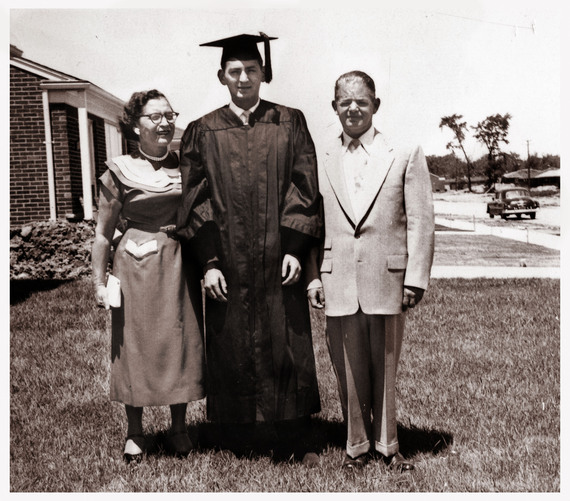For far too many American students, the odds of succeeding in college remain low.
Fewer than half of all high school seniors graduate ready to take on college-level coursework. Rising tuition costs make paying for college increasingly challenging, especially for low-income students. And those whose parents did not graduate from college have a far lower chance of getting ahead themselves.
But students don't need to hear statistics like that. They need to hear about the successes. They need #ProofPointDay.
This year marks the first of what I hope will be an annual celebration of individuals who are first-generation college graduates in their families. Created by a public school educator, Proof Point Day asks first-generation college graduates to wear green on May 30 so younger students can look to them for inspiration.
That's why I'm wearing green on May 30.
My parents valued education but didn't go to college -- they didn't even graduate from high school -- because they had to work to support their families. They always encouraged me to pursue higher education, even though I wasn't a great high school student, and I had to navigate the college admissions process myself.
Even when I actually made it to Michigan State University, I had to figure out how to pay my own way. Between taking classes during the day and working evenings and breaks, I was exhausted. But I managed to stick to it.
Attending Michigan State more than paid off. College is where I found professors who believed in me. I discovered the passion for numbers that would become the foundation of my four careers. I developed enough of a love for learning to even give teaching a try, helping returning war veterans learn the basics of accounting at the Detroit Institute of Technology. It was a much tougher job than starting up my homebuilding and financial services businesses.
After I left the world of commerce, I chose to devote my time to philanthropy, specifically in the area of improving America's public schools because I know that a great education is what levels the playing field and ensures a solid foundation for a successful life. I know how important public education was for me and my family, and I know what it can do for this and future generations of students. Despite concerns about rising tuition and student debt, a college degree remains crucial to economic mobility. Last year, Americans with four-year college degrees earned nearly double what those did without one. Students who graduate from college will make more than $1 million over their lifetimes than students who only have a high school diploma. Students today can't afford not to go to college.
To make higher education accessible to more first-generation students, a lot of work needs to be done. Financial aid has to go further and be less burdensome. Colleges need to do more to solicit students from disadvantaged backgrounds and support them once they enroll. Undocumented students who have worked hard in our public K-12 schools should be afforded the same in-state tuition rates as their classmates. Elementary, middle and high schools need to embrace the Common Core State Standards to raise expectations and college readiness for all students so that they're prepared to succeed in college. And more high schools need to follow the example of outstanding public schools like those run by KIPP and YES Prep, which are focused on ensuring their high school graduates also graduate from college.
As we work toward those goals, let's celebrate success. Let's give students reasons to hope rather than to doubt. Let's wear green on May 30.
Eli Broad is founder of The Broad Foundations. He and his wife, Edye, have invested billions of dollars to improve K-12 schools, advance scientific and medical research and increase public access to contemporary art.
